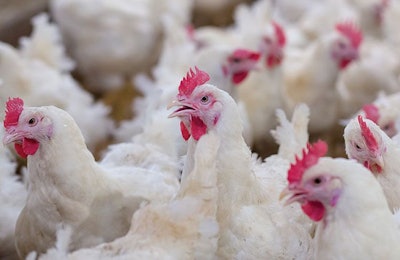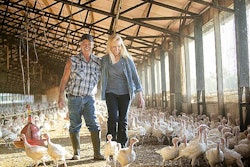
The majority of poultry growers and veterinarians recently polled believe that animal health and welfare, as well as food safety, are more at risk in a raised-without-antibiotics (RWA) production operation than those raised with the judicious use of antibiotics.
That same group of poultry professionals believes that the majority of consumers believe the opposite to be true.
Dr. Randall Singer, professor of epidemiology, University of Minnesota, presented those findings, which were revealed in the study, “Potential Impacts of No Antibiotics Ever/Raised without Antibiotics Production on Animal Health and Welfare,” during a presentation at the 2018 Animal Agriculture Alliance Stakeholders Summit, held in May in Arlington, Virginia.
Singer was one of the authors of the study.
The study was survey-based with 565 respondents representing the broiler, turkey, pig, beef and dairy industries. Of those, 69 were broiler industry professionals and 23 were turkey industry professionals.
Their experience with RWA production was varied. Of the broiler professionals, two-thirds were either currently or formerly involved with RWA production. About 22 of the 23 turkey professionals responding had current involvement with RWA production, with the remaining one having never been involved.
More than 95 percent of the respondents across all species were based in the United States.
Impact on animal health and welfare
“We have heard that the demand for RWA products has been growing in the United States, but we have also heard there are concerns that these RWA claims and associated production practices are negatively affecting animal health and welfare,” Singer said.
So the survey, which was done from February 15 to March 23, asked those in the industry if it thought RWA production had a negative effect on the animal.
Of the broiler producers either currently or formerly active in RWA production, 29 of 42 thought RWA programs either significantly worsened or slightly worsened animal health and welfare. Of the turkey producers involved in RWA production, 17 of 22 that responded said it either significantly or slightly worsened health and welfare.
Of those in conventional broiler production, an overwhelming percentage thought RWA production worsened animal health and welfare. The answer of the one conventional turkey production professional respondent was not revealed in fairness to that person.
While those involved in the poultry industry reached a consensus that RWA production compromises health and welfare, that same group of respondents said they believed consumers think that not using antibiotics actually improves it.
More than half of those with experience in RWA broiler operations said they believed the consumer thought that not using antibiotics helped health and welfare, while all but one respondent in conventional broiler production said they believed consumers thought RWA production either helped health and welfare or had no impact. Only one of 21 people involved in turkey production that responded to the question believed consumers thought RWA production worsened animal health.
Singer also pointed out that more than 80 percent of all respondents in RWA poultry production said their operations’ decision to eliminate antibiotics was due to client/customer requests.
The responses for those in the pig, beef and dairy industries concerning their perceptions and the consumers’ perceptions on antibiotic use were very similar, Singer said.
“We found this huge discrepancy between what the respondent believes and the perception of that respondent of what the customer or retailer believes,” said Singer. “That is a major communication gap, that somehow we have to close.”
Food safety views
The difference between the views of those in the poultry industry and what industry professionals think retailers believe is also noticeable, Singer said.
Only eight respondents involved in RWA broiler production thought that removing antibiotic use improves food safety, while none in conventional broiler production did. Only one person in the turkey industry thought RWA production improved food safety.
But those same respondents thought those that serve and consume poultry products have opposite views. Thirty-one of those 42 respondents in RWA broiler operations believe the retailers think RWA production is better for food safety, nine of the 17 respondents in conventional production think retailers link RWA production to improved food safety, and 15 of the 21 RWA turkey respondents believe retailers see RWA production as a way to improve food safety.

















